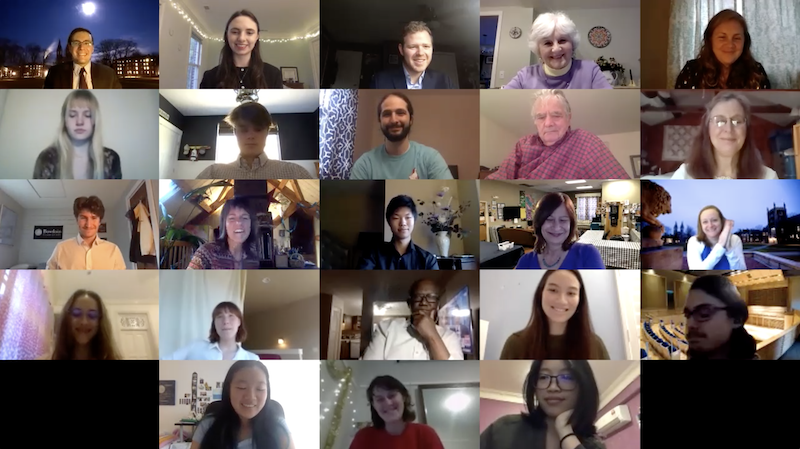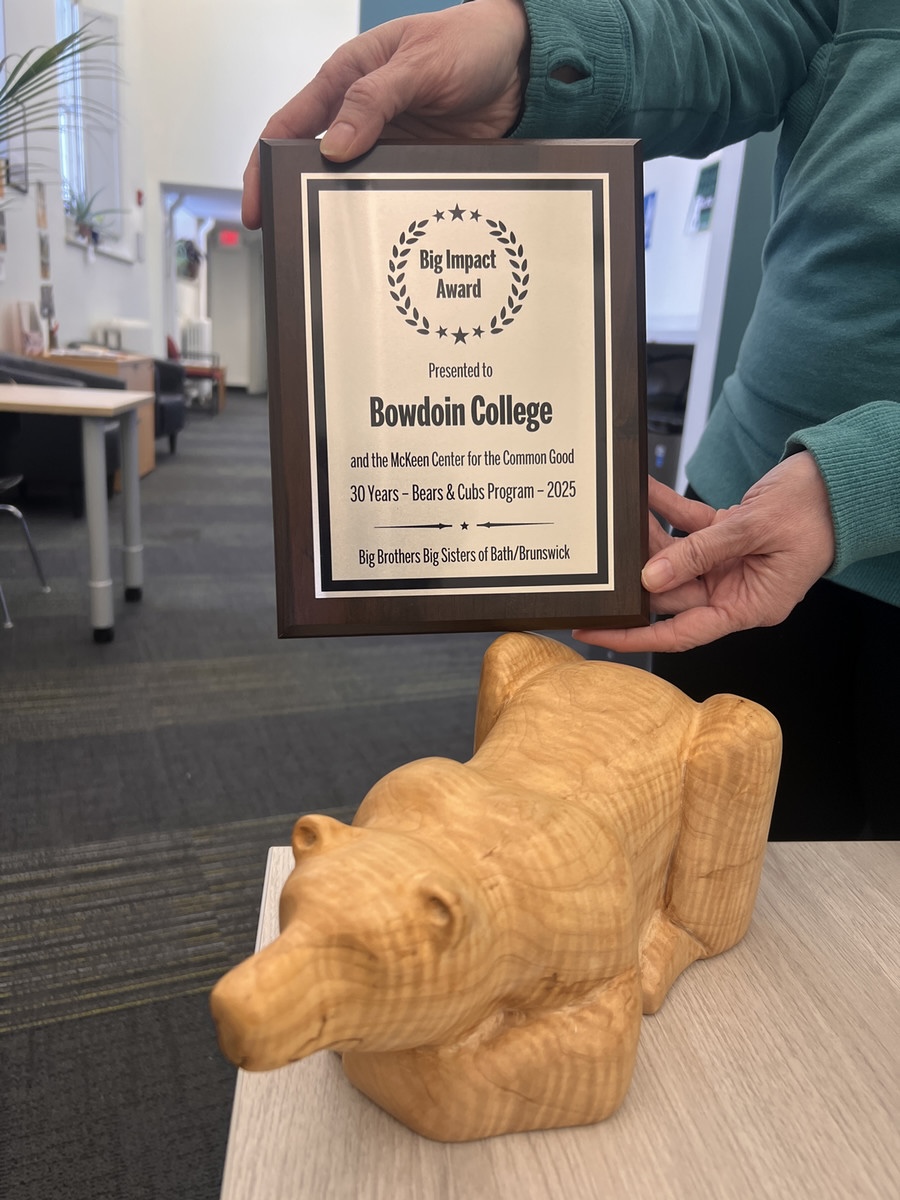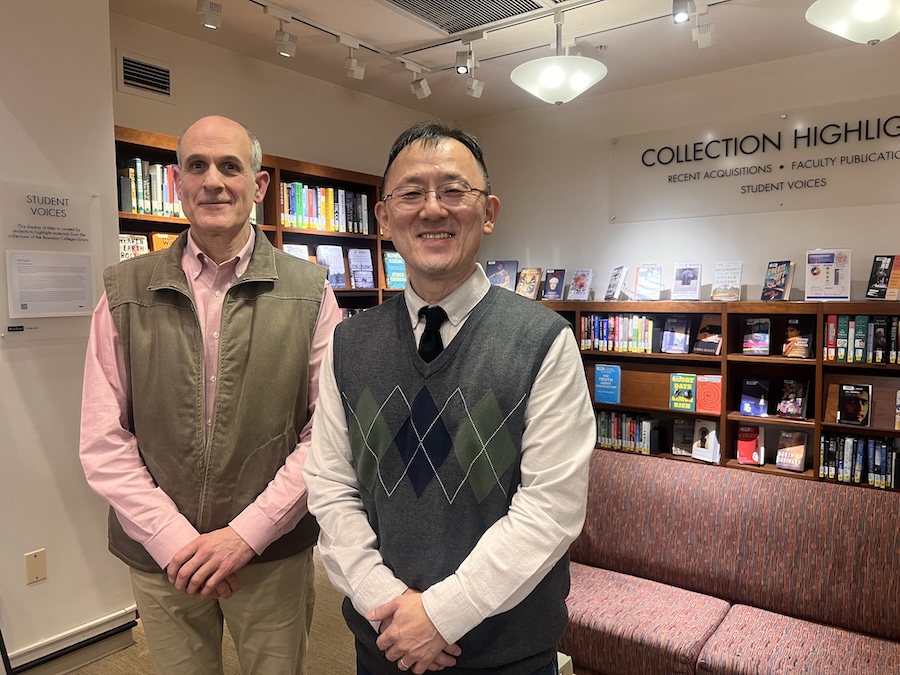In Hard Times, Common Good Grant Students Make Critical Decisions
By Rebecca Goldfine
Sixteen students, plus two student leaders, participated in Bowdoin's nineteenth annual Common Good Grant program—a program run by the McKeen Center for the Common Good. They recently held a ceremony, via Zoom, to bestow $20,340 to seven local nonprofits.
The Common Good Grant program was established in 2001, when an anonymous donor began giving $10,000 each year to students to allocate to agencies. Acting like a community foundation, Common Good Grant students both solicit donations to augment the grant base and evaluate grant proposals from local nonprofits to award funds in the spring.
Since its inception, the program has distributed over $326,000 to more than 162 nonprofits in the community.
"I believe strongly in the mission of this program, both for the direct good it does in our local communities and for the exceptional educational experience it provides our students," said Tom Ancona, who advises the Common Good Grant program for the McKeen Center. Participating students "show incredible thirst to learn, and wonderful care and consideration."
2019–2020 Common Good Grant program members:
Grant Committee: Jessica Bae ’22, Marie Caspard ’20, Amy Hussey ’23, Maggie Millar ’22, Madisen Miller ’22, Brian Ou ’23, Zain Padamsee ’23, and John Sweeney ’20
Development Committee: Jackson Coyle ’23, Jeannie Davis ’20, Song Eraou ’23, Mer Feero ’23, Leif Maynard ’23, Margot Ngo ’23, Micaela Simeone ’22, and Kevin Ye ’23
After students apply and are selected, they meet weekly starting in September to learn about the work of nonprofits and foundations, and to begin reviewing applications. Participants serve either on the program's grant committee, which determines which organizations are funded, or on the development committee, which raises extra money to add to the original fund.
When this semester was disrupted by the novel coronavirus, the students continued their work remotely. Amanda Cassano ’22, who is one of the program's two student leaders with Matthew Henry ’20, said she was impressed by the commitment shown by her peers to finish out the process.
"I'm more proud than anything else of the efforts of committee members who stayed engaged and dedicated to the program and came together in these final weeks to allocate funding to organizations," she said. "These students really care and came together to make this a successful program."
Their final decisions on which organizations to fund took a notable turn after COVID-19 forced people into their homes and precipitated the loss of millions of jobs. "It was almost amazing how much it dominated the decision-making from the sidelines," Henry said.
Discussions among students took on a heavier significance as the toll of COVID-19 became clearer. "Not every organization is going to come back from this, so our thought process was, what kind of services in a community do we still want to see being met after this is over?" Cassano said.
"This funding means more now than any other time, because this is a turning point for a lot of nonprofits," she continued. "It's precarious, and donations now have an impact on whether they make it through the crisis."
At the start of the process, forty-two organizations submitted letters of intent for grants. Students whittled that down to twenty organizations that they encouraged to submit complete grant proposals. From that point, students selected thirteen finalists for site visits (these were held remotely earlier in April).
In the end, the grant committee awarded funding to seven organizations that work within four areas: the environment and sustainability, arts and culture, health and human services, and education and community development.
"We do this so we have a grant recipient in each category, so we can balance the more immediate need of health and human services that might dominate the process otherwise," Henry explained. "This year especially proved to us why the arts and culture bucket might be necessary to include."
Music and art can provide comfort and solace to people during times of stress, Henry said. "I think a lot of these organizations that might be overlooked because they don't focus on health still have a dramatic impact on the lives of the people they serve."
- ArtVan, Brunswick: To provide a safe, creative, supportive setting, explore mature art techniques, and dive deeply into artistic development and its emotional and social content. ArtVan aims to provide consistent programs and build relationships with youth to encourage them to develop new ways of communicating, changing destructive and/or unconstructive behaviors, developing problem-solving skills, and relating to others in positive ways.
- Friends of Merrymeeting Bay, Richmond: To support certified lab consumables from IDEXX, data analyses, plus individual, municipal, and legislative outreach to help upgrade water quality on the Lower Androscoggin River.
- Morris Farm, Wiscasset: To develop a new Local Food Buying Club for low-income community members by connecting SNAP program beneficiaries to local food and produce. Funds will purchase two commercial refrigerators and a part-time nutrition consultant to help design the nutrition education component of the project.
- Home to Home, Brunswick: To create a website and print materials to increase awareness of their services, which include organizing supervised visitations between custodial and non-custodial parents and their children.
- Brunswick Area Teen Center, Brunswick: To increase additional staffing needed to support the rapidly increasing number of youth and families attending programs.
- Midcoast Humane, Brunswick: To continue to provide services to low-income families, including low-cost vaccinations, spay/neuter vouchers, expert veterinarian services, microchip clinics, and thousands of pounds of pet food.
- Greater Portland Immigrant Welcome Center, Portland: To reach and engage more immigrant communities with civic education and voter registration leading up to the 2020 election. The grant will cover the costs of phone banking and training phone banking consultants who will answer questions regarding ballot forms and voter registration and offer assistance with citizenship applications.



